Prof. Jeremy Simpson
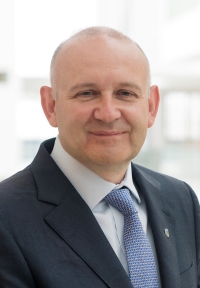
Jeremy Simpson obtained his PhD from the University of Warwick (UK). After post-doctoral work at the Scripps Research Institute (San Diego, USA) and the ICRF (London, UK), a long term EMBO fellowship took him to the EMBL (Heidelberg, Germany), where he developed and applied novel high-throughput imaging approaches to study protein localisation and membrane traffic in mammalian cells. In 2008 he was appointed as Full Professor of Cell Biology at University College Dublin (Dublin, Ireland). His lab applies high-throughput imaging technologies to study intracellular trafficking pathways, diseases associated with organelles of the endomembrane system,and the internalisation routes taken by synthetic nanoparticles on exposure to cells. His lab also develops novel 3D cell models allowing the quantitative study of cell behaviour at multiple scales, with applications in drug delivery. He has authored over 120 peer-reviewed articles, including articles in Nature Cell Biology, Nature Communications, Nature Methods and Scientific Reports and runs the UCD Cell Screening Laboratory. He is currently the College Principal and Dean of Science.
Dr. Margaritha Mysior
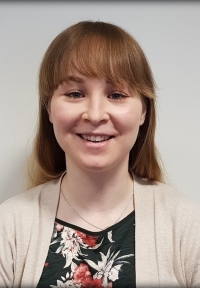
Margaritha completed her Bachelor and Master degrees in Molecular Biology at the Westphalian University of Applied Sciences in Recklinghausen, Germany. She undertook her Master thesis work in the laboratory of Prof. Jeremy Simpson in UCD from October 2016 to August 2017. During this time, she characterised five novel proteins involved in the regulation of the Golgi-to-ER retrograde pathway in mammalian cells. She recently completed her PhD in Prof. Simpson’s laboratory, developing a three-dimensional (3D) cell model (spheroids) to investigate membrane trafficking events. A component of this work was undertaking a comparative study with a conventional two-dimensional (2D) monolayer cell model. Margaritha worked as a research scientist in the laboratory for 2 years continuing her research on how membrane trafficking events are regulated in spheroids. Margaritha was awarded an Irish Research Council Postdoctoral fellowship in 2023 to continue her research on membrane trafficking events in cells growing in a 3D context.
Sofia Parisi
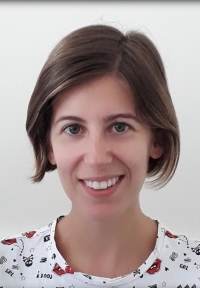
Sofia has a Bachelor’s degree in Natural Sciences from the University of Palermo in Sicily, and a Master’s degree in Genetics and Molecular Biology from the Sapienza University of Rome, Italy. She was awarded an Irish Research Council fellowship in 2019, enabling her to move to Dublin and carry out her PhD studies in the lab of Prof. Simpson, working on small GTP binding proteins of the Rab family. These proteins play essential roles in the organisation of cellular organelles and the trafficking pathways that operate between them. Recently it has been found that mutations in the gene encoding for Rab33B are responsible for a hereditary skeletal dysplasia called Smith-McCort dysplasia. The aim of her project is to characterise the Rab33B protein, to better understand its role in healthy cells and what goes wrong in cells that contain the mutated versions.
Alannah Chalkley
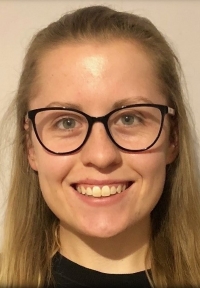
Alannah received her undergraduate degree in Cell and Molecular Biology from UCD in 2019. She was awarded Irish Research Council funding in 2019 to carry out her PhD and is currently in her third year. Her research focuses on how nanoparticles (NPs) are internalised and trafficked through cells when they grow as 3D spheroids. This project aims to provide the first molecular understanding of the mechanisms by which NPs , as potential drug delivery vehicles, penetrate into solid tumours, using in vitro grown cellular spheroids as a model system.
Adele Connor
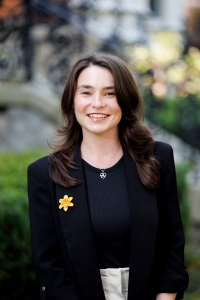
Adele received a 1st class honours degree in Biology and Chemistry from Maynooth University in 2014, with an international year spent at York University in Toronto, Canada. She then completed a one year MSc in Biomedical Science at Ulster University in 2015. Adele joined UCD and worked as a Research Assistant for two years in Assoc. Prof. Antoinette Perry’s lab where she focused on the epiCaPture project. Adele was awarded an Irish Cancer Society Scholarship in 2020 to carry out a PhD project entitled - ‘Investigating the heterogeneic biology of ovarian cancer metastasis using high resolution imaging to inform novel combination therapies’. Adele began her PhD in January 2021, supervised by Assoc. Prof. Antoinette Perry (UCD), Prof. Jeremy Simpson (UCD) and Assoc. Prof. Joanne Lysaght (TCD) and in collaboration with Prof. Donal Brennan (Mater Misericordiae University Hospital). Adele was nominated for the Irish Cancer Society’s PhD Scholar of the year in 2023, and has presented her work at conferences in Ireland, Italy and America. Adele is an active member of the Irish Network of Gynaecological Oncology, and was involved in the successful application to the Irish Cancer Society’s Public and Patient Involvement Award 2022 for a project entitled ‘Broadening Patient Involvement in Ovarian Cancer Research’.
Teerna Banerjee

Unmani Jaygude
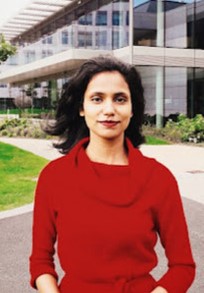
Unmani is a BTech. Biotechnology graduate from Pune University, India. In 2018 she moved to Dublin, and completed her MSc in Biological and Biomolecular Science from UCD. In 2021 she was accepted on to the SFI Centre for Research Training in Foundations of Data Science, and has started her PhD in the lab of Prof. Simpson, co-supervised by Dr. Graham Hughes. Her project involves analysing data from Multicellular Tumour Spheroids (MCTS) models in the context of exploring protein subcellular localisation and targeting them as part of drug development. She is specifically focused on small GTPase proteins of the Rab family, and finding links between cell-based experimental data and existing cancer genomic, transcriptomic and expression datasets. Her work integrates high-content screening data from MCTS models with genomic and transcriptomic data, highlighting potential expression patterns in Rab family contributing to cancer progression.
Lucy Dornan
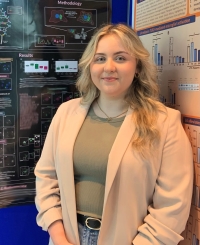
Lucy completed her undergraduate BSc. (Hons) in Cell & Molecular Biology from UCD in 2022, including a final year research project supervised by Prof. Simpson. In 2022, she was awarded a Government of Ireland Postgraduate Scholarship from the Irish Research Council to fund her PhD, and she is now in the second year of her project supervised by Prof. Simpson. Her project aims to explore the role of Rab6 in the regulation of the Golgi apparatus, specifically in its regulation of the COPI-independent tubular retrograde transport pathway from the Golgi apparatus to the endoplasmic reticulum. This transport pathway’s existence has been common knowledge since 1999, however a consolidated theory of transport tubule mechanics remains to be presented.
Maëva Lopez
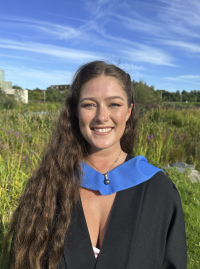
Maëva received her undergraduate degree in Cell and Molecular Biology from UCD in 2023. She is currently in her first year of PhD study, co-supervised by Prof. Jeremy Simpson and Assoc. Prof. Susan Quinn (UCD School of Chemistry). Her research focuses on the transport of nanoparticles in cells. This project aims to direct nanoparticles to specific intracellular compartments and between individual cells in advanced tumour spheroid lung models. This research will advance our understanding of how nanoparticles are transported in cells so that we can improve their utilisation as drug delivery vehicles.
Danielle Harte
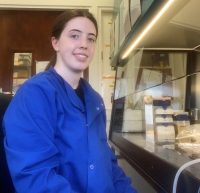
Danielle received her undergraduate degree in 2023 from UCD in Cell and Molecular Biology, and is now in the first year of her PhD. Her project centres on understanding the secretory pathway on a single-cell basis in tumour models. Recently it has been seen that cells cultured in 2D versus 3D models have differences in the regulation of secretion, and also that cells within the same tumour have different secretory outputs. To understand this, Danielle’s research involves developing a novel assay of the secretory pathway using high-resolution quantitative fluorescence imaging of 3D multicellular tumour spheroids. Her project aims to provide a novel perspective on how secretion is regulated in tumour models, potentially informing future cancer therapies.
Madeleen Brink
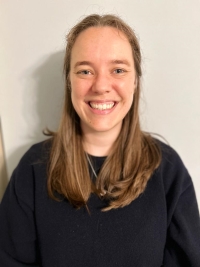
Madeleen Brink completed her Bachelor's and Honour's degrees at the University of the Free State, South Africa. Following this, she finished her Master's in Health Science at the Laser Research Centre, University of Johannesburg, South Africa. She is set to pursue her PhD under the supervision of Prof Jeremy Simpson with the CLEXM Consortium, a Marie Sklodowska-Curie Doctoral Networks Action (MSCA-DN) funded by the European Union under Horizon Europe. Her project aims to track the delivery of nanoparticles into cells by applying correlative microscopy. Soft X-ray tomography (SXT) will be evaluated as an alternative or complementary correlative microscopy method to systematically assess and quantify nanoparticle uptake and distribution in cells.
Hend Shayoub
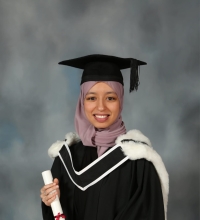
Hend received her undergraduate degree in Chemical Sciences from TCD in 2023 in which she specialised in Medicinal Chemistry. She is currently in her first year of her PhD under the supervision of Assoc. Prof Susan Quinn (primary supervisor) and Prof. Jeremy Simpson (co-supervisor). Her research focuses on synthesising various carbon-based nano-scaffolds such as carbon dots and gold nanocarbon composites and looking at their interaction with DNA as well as their cell uptake. This will enable us to develop an understanding of the potential applications of these nano-scaffolds in targeted drug delivery systems which can provide the foundation for designing novel nanocarriers for therapeutic agents.